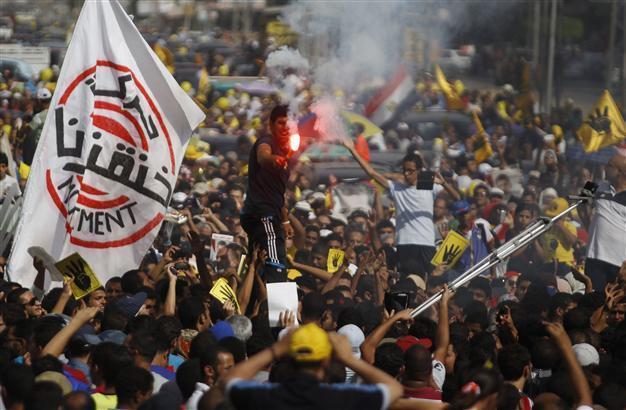At least four killed in Egypt as Brotherhood protests against army-backed rule
CAIRO - Reuters

Members of the Muslim Brotherhood and supporters of ousted Egyptian President Mohamed Morsi shout slogans during a protest against the military near Rabaa al-Adawiya square, at Cairo's Nasr City district, Oct. 4. REUTERS photo
At least four people died in clashes on Oct. 4 as supporters of deposed President Mohamed Morsi mounted their boldest marches since troops crushed their protest camps demanding his reinstatement on Aug. 14.
An Egyptian army vehicle fired live rounds in the direction of Brotherhood supporters who had been pushed back by security forces when they tried to enter Cairo's Tahrir Square, the symbolic heart of Egypt's 2011 uprising.
Four people were killed in clashes in two neighbourhoods of Cairo, an interior minister spokesman said in comments published by state-run newspaper Al-Ahram late on Oct. 4. All four were Brotherhood supporters, security sources said.
Major General Sayed Shafiq, assistant interior minister for public security, denied any protesters had died in the southern city of Assiut. Medical and health sources had earlier said four people had been killed in Assiut, without saying which side they were on.
In Cairo, onlookers threw rocks at pro-Mursi protesters, who hurled them back. Riot police earlier fired tear gas to push back the march.
Thousands of protesters headed toward the site in northeast Cairo of one of the former Brotherhood protest camps crushed by security forces in August. By late afternoon, protesters had retreated from the area.
Members of the Brotherhood, which has been banned by court order, tried to reach the presidential palace but were turned back by police.
The state news agency said protesters failed in attempts to reach the defence ministry and a Republican Guard facility.
Fighting also erupted in Egypt's second city Alexandria and two Nile Delta cities.
The Brotherhood won every election after a popular uprising ousted autocrat Hosni Mubarak in 2011, but became deeply unpopular under Morsi's rule.
Morsi was accused of trying to give himself sweeping powers and entrenching the Brotherhood, allegations he denies.
Egypt has been gripped by political and economic turmoil since army chief General Abdel Fattah al-Sisi overthrew Morsi, the country's first freely elected president, on July 3 after mass protests against his rule.
On Aug. 14, Egypt's military-backed authorities smashed the two pro-Morsi sit-ins in Cairo, with hundreds of deaths, and then declared a state of emergency and imposed a curfew.
Many of the Brotherhood's top leaders have been arrested since. "They want a country without religion," said protester Rasha al-Malky.
Talks with EU foreign policy chiefThe violence on Oct. 4 came a day after European Union foreign policy chief Catherine Ashton held talks in Cairo with top government officials, al-Sisi, and two Brotherhood politicians and urged both sides to pursue reconciliation.
There was no sign either side was prepared to heed her call.
Al-Sisi has promised that a political road map will lead to elections in the Arab world's most populous nation. The Brotherhood, which says the military staged a coup, has refused to take part in the political transition.
Clashes in Cairo broke out as Morsi supporters tried to enter the centre of Tahrir Square, the rallying point for hundreds of thousands of protesters during the popular uprising that toppled autocrat Hosni Mubarak in 2011.
The protesters chanted slogans calling for the removal of al-Sisi and waved Egyptian flags.
State news agency MENA said the army fired warning shots and tear gas to prevent Brotherhood supporters from crossing a bridge leading into the square.
Protesters wrote graffiti on the wall of a building near Tahrir reading "Egypt is Islamic." Others chanted "You coward al-Sisi" as tear gas billowed in the air.
Political tensions have decimated investment and tourism, a pillar of the economy. Attacks by militant groups based in the Sinai Peninsula have risen sharply since Morsi's ouster, with almost daily operations against soldiers and police.
